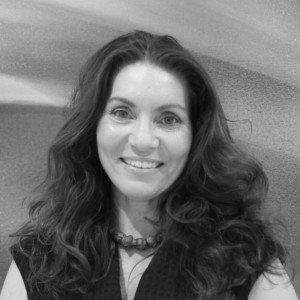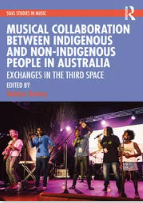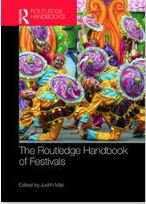Dr Candace Kruger is a Yugambeh Indigenous elder, musician and music educator, passionately devoted to the power of song as a vehicle for transmitting Indigenous knowledges and living culture.
 Before coming into education research and completing a Master of Arts Research and PhD on the revival of the Yugambeh language, Candace worked as a classroom music educator throughout Australia, with a diverse array of pedagogical curriculum approaches and specialising in boys’ education.
Before coming into education research and completing a Master of Arts Research and PhD on the revival of the Yugambeh language, Candace worked as a classroom music educator throughout Australia, with a diverse array of pedagogical curriculum approaches and specialising in boys’ education.
Inspired by seeing African Children singing in African languages and Chinese children singing in Mandarin at the 2012 World Choir Games in Cincinatti Ohio, around 10 years ago, Candace felt a call to come home and teach and share Indigenous songs with Indigenous children in Australia.
Candace says:
“I had this moment where I knew I wanted to reinvigorate cultural tradition, so rather than it be tradition, it is a part of living culture. It is important because we are talking about modernity and the now of culture, rather than the past.”
During her childhood, Candace says she learnt about culture on the oyster banks of Moreton Bay and in life on the Gold Coast, and heard language and learnt stories. At that time there wasn’t really a separation between growing up and learning Aboriginal culture and therefore, she didn’t really recognise that she was learning culture.
Candace says:
“My research and research journey has come as a retrofit to the information that I have gathered in community. After I finished my music degree, my Grandfather asked me to gather the songs the he had known during his childhood.”
In 2016 Candace applied to Griffith to do a Master of Arts Research so that she could share the journey of the Yugambeh Youth choir. Her research has brought her voice and passions to life, working in the important niche area of reviving Indigenous language. In her PhD, Candace worked on ethical permissions and protocols as part of developing and disseminating a Yugambeh song workbook that allows educators to embed Indigenous knowledges and languages into school curriculums.
On her research process, Candace says:
“My research “singing Indigenous language alive” came about because people were asking me to help embed Indigenous songs into curriculum. I was happy in the classroom, and as Head of Department, I never saw myself doing a PhD, but after my master’s was completed, people wanted me to continue. I realised I had a voice, that my voice was unique and this wasn’t happening anywhere else.”
Candace’s research has evolved into a few different strands, representing the multifaceted nature of Indigenous education.
The Yugambeh Youth Choir has been running for just over seven years and part of Candace’s work today is looking at the benefits to the children who have been a part of this process as they’ve grown into adults and gone onto work or their own studies at university.
“It’s been incredibly rich to discuss with the now 18+ year old’s how this process has benefitted them and how they feel about the choir.”
Candace is also working with Professor Beryl Exley and Indigenous education students to try and grow the Indigenous teaching workforce.
Her song workbook developed during her PhD has the protocols, permissions and knowledges for teachers and educators to embed into curriculum, and Candace works with educators in a professional development capacity to better understand community and children in the embedding of Indigenous knowledges.
“My specialist field is Indigenous music education, but overall, I am also involved in assisting educators to understand, work with and get to know communities and embed subject areas. Music is one aspect of this, but I work holistically with Indigenous knowledges and education.”
Part of this includes working with Elder Ted Williams, and her father Elder Ian Levinge, both retired Indigenous teachers, on a Yugambeh education project which hopes to inspire schools and teachers to learn more about Indigenous language, music and knowledge, collectively as a region.
Candace has been highly acclaimed and recognised for her work and contributions. In 2021, the Australian Music Examinations Board (AMEB) commissioned a song for its National Online Orchestra project with Candace as lyricist and composer, and in 2021 she was awarded the Australian Society for Music Education (ASME) National Teaching Award for Excellence in Indigenous Music. Alongside this work, her Yugambeh Youth Choir performed in the closing ceremony of the Commonwealth Games in 2018, and in 2022 with the Australian Wallabies and Wallaroos, making national history, and additionally have performed for many state, national and international conferences.
Candace says it’s been rewarding to have full recognition of herself as a Yugambeh song woman, her heritage language and the work that her choir are doing. This has been instrumental in the recognition and revival of Indigenous languages, although the path has not been easy.
She says:
“This has been going on for a long time, it’s been a lot of hard work to get the region to sing Yugambeh language before the national anthem. I am hoping that this will allow us to engage with Indigenous language and knowledges at a whole other level.”
Having learned her ancestral language later in life, Candace knows that learning a language is a contextual, relational process.
“Language learning is a process of continually uncovering the nuances of language and what they mean. Songs are a good way to learn language holistically but the next stage with Yugambeh language is more formal and should be a staged learning process.”
Hidden in Plain Sight is a term that Candace feels aptly describes what we all know but don’t recognise as Indigenous languages and culture. When Candace speaks with audiences she will always talk about the place names that we all know, but don’t recognise as Indigenous language. In this way, Candace sees herself as a jigsaw puzzle expert, helping to bring into sight what is already there but knows that there is more work to be done to truly reinvigorate Indigenous language and ways of knowing.
On what motivates her, Candace says:
“We have so many opportunities now as a choir and music is such a positive space to be in. I see learners from a young age in music developing skill upon skill upon skill – eventually flourishing as great musicians. There is a sense of satisfaction when you get to produce and mold people’s craft. It’s creative, and I’m a creative person, so I love that.”
Read more about Candace’s work in the publications below:




